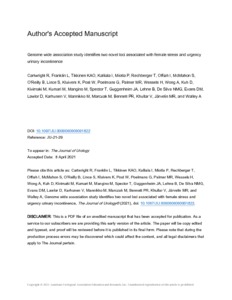Cartwright, R;
Franklin, L;
Tikkinen, KAO;
Kalliala, I;
Miotla, P;
Rechberger, T;
Offiah, I;
McMahon, S;
O'Reilly, B;
Lince, S;
et al.
Cartwright, R; Franklin, L; Tikkinen, KAO; Kalliala, I; Miotla, P; Rechberger, T; Offiah, I; McMahon, S; O'Reilly, B; Lince, S; Kluivers, K; Post, W; Poelmans, G; Palmer, MR; Wessels, H; Wong, A; Kuh, D; Kivimaki, M; Kumari, M; Mangino, M; Spector, T; Guggenheim, JA; Lehne, B; De Silva, NMG; Evans, DM; Lawlor, D; Karhunen, V; Mannikko, M; Marczak, M; Bennett, PR; Khullar, V; Järvelin, M-R; Walley, A
(2021)
Genome Wide Association Study Identifies Two Novel Loci Associated with Female Stress and Urgency Urinary Incontinence.
J Urol, 306 (3).
pp. 679-687.
ISSN 1527-3792
https://doi.org/10.1097/JU.0000000000001822
SGUL Authors: Walley, Andrew John
![[img]](https://openaccess.sgul.ac.uk/113217/3.hassmallThumbnailVersion/00076734-900000000-97196.pdf)  Preview |
|
PDF
Accepted Version
Available under License ["licenses_description_publisher" not defined].
Download (1MB)
| Preview
|
Abstract
BACKGROUND: Genome-wide association studies (GWAS) have not identified replicable genetic risk loci for stress or urgency urinary incontinence. METHODS: We carried out a discovery stage case control GWAS in three independent discovery cohorts of European women (n=8,979) for stress incontinence, urgency incontinence, and any incontinence phenotypes. We conducted replication in six additional studies of European ancestry (n=4,069). We collected bladder biopsies from women with incontinence to further investigate bladder expression of implicated genes and pathways (n=50) and used symptom questionnaires for phenotyping. We conducted meta-analyses using inverse variance fixed effects models in METAL, and whole transcriptome analyses using Affymetrix arrays, with replication with TaqMan PCR. RESULTS: In the discovery stage we identified 16 single nucleotide polymorphisms (SNPs) genotyped or imputed at five loci that reached genome-wide significance (p<5x10-8). In replication, rs138724718 on chromosome 2, near the macrophage receptor with collagenous structure (MARCO) gene (replication p=0.003) associated with stress incontinence. In addition, rs34998271 on chromosome 6 near the Endothelin 1 (EDN1) gene (replication p=0.0008) associated with urgency incontinence. In combined meta-analyses of discovery and replication cohorts, associations with genome-wide significance for these two SNPs were confirmed. Transcriptomics analyses showed differential expression of 7 of 19 genes in the endothelin pathway between stress and urgency incontinence (p<0.0001). CONCLUSION: We uncovered two new risk loci near the genes Endothelin 1 (EDN1), associated with urgency incontinence and Macrophage Receptor with Collagenous Structure (MARCO), associated with stress incontinence. These loci are biologically plausible given their roles in smooth muscle contraction and innate host defense respectively.
| Item Type: |
Article
|
| Additional Information: |
This is a non-final version of an article published in final form in Cartwright, R; Franklin, L; Tikkinen, KAO; Kalliala, I; Miotla, P; Rechberger, T; Offiah, I; McMahon, S; O'Reilly, B; Lince, S; et al. (2021) Genome Wide Association Study Identifies Two Novel Loci Associated with Female Stress and Urgency Urinary Incontinence. J Urol, 306 (3). pp. 67-687. |
| Keywords: |
ALSPAC, genetics, genome-wide association study, genomics, stress urinary incontinence, urgency urinary incontinence, Urology & Nephrology, 1103 Clinical Sciences |
| SGUL Research Institute / Research Centre: |
Academic Structure > Institute of Medical, Biomedical and Allied Health Education (IMBE)
Academic Structure > Institute of Medical, Biomedical and Allied Health Education (IMBE) > Centre for Biomedical Education (INMEBE) |
| Journal or Publication Title: |
J Urol |
| ISSN: |
1527-3792 |
| Language: |
eng |
| Publisher License: |
Publisher's own licence |
| Projects: |
|
| PubMed ID: |
33904754 |
| Dates: |
| Date |
Event |
| 2021-09 |
Published |
| 2021-04-27 |
Published Online |
| 2021-04-08 |
Accepted |
|
 |
Go to PubMed abstract |
| URI: |
https://openaccess.sgul.ac.uk/id/eprint/113217 |
| Publisher's version: |
https://doi.org/10.1097/JU.0000000000001822 |
Statistics
Item downloaded times since 06 May 2021.
Actions (login required)
 |
Edit Item |



